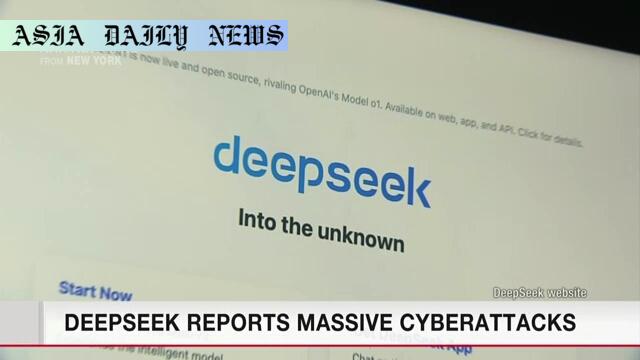Cyberattacks have affected DeepSeek’s services, prompting limitations in user registrations, as reports suggest US-based origins.
Cyberattacks disrupted Chinese AI startup DeepSeek, prompting limited user registrations.
Attacks reportedly originated from IP addresses based in the United States.
The incidents have heightened global tension in the tech space, especially between China and the US.
DeepSeek’s generative AI technology has drawn global attention, sparking international concerns.
Authorities in both the US and China are investigating the security implications.

The Escalation of Cyberattacks Against DeepSeek
In recent news, Chinese artificial intelligence startup DeepSeek has fallen victim to a series of debilitating cyberattacks. The company, known for its development of a cost-efficient generative AI model that has gained global acclaim, announced that it was taking precautionary measures by limiting new user registrations. This decision stems from the large-scale and malicious attacks that have disrupted its services since January 3, 2023. These cyberattacks reached their peak intensity on Monday and Tuesday, raising significant concerns about the security of emerging technology ecosystems.
Evidence of US-Based Attacks
Reports emerging from Chinese media suggest that all cyberattacks on DeepSeek originated from IP addresses located in the United States. Though these findings are still under investigation, the revelation has sparked a heated debate regarding the motives and implications of these attacks. Chinese cybersecurity experts have cited the incidents as a potential tactic aimed at targeting China’s burgeoning tech advancements, propelling issues of cybersecurity and national tech sovereignty to the forefront.
DeepSeek’s Role in Advancing AI Technology
DeepSeek has gained prominence for its groundbreaking work in artificial intelligence, particularly in creating an affordable yet highly capable generative AI model. This innovative technology has been celebrated worldwide and has become a point of interest and concern for major players in the global tech industry. However, the cyberattacks not only threaten DeepSeek’s infrastructure but also raise broader concerns about the vulnerability of emerging technologies to international cyber threats.
US Investigation Into Allegations
The situation has garnered attention even from the United States government. White House Press Secretary Karoline Leavitt recently commented that the National Security Council has initiated investigations into the security implications of DeepSeek’s breakthroughs. Furthermore, OpenAI, the US-based developer behind ChatGPT, has reportedly launched its own investigation into allegations suggesting that individuals with ties to DeepSeek might have improperly obtained substantial data using OpenAI’s frameworks. These intertwined concerns only compound the already fraught relations between the two leading nations in technological innovation.
The Growing Global Tension
The series of cyberattacks against DeepSeek continues to highlight an escalating sense of rivalry between Chinese and US technology sectors. These incidents not only threaten DeepSeek’s operations but also carry the potential to escalate geopolitical tensions between the world’s two largest economies. The repeated occurrence of security breaches underscores the urgent need for robust cybersecurity frameworks that transcend national interests and aim at protecting enterprises globally.
Looking Ahead
As DeepSeek recovers from this ordeal, questions surrounding international cybersecurity cooperation intensify. Governments, companies, and individuals alike must grapple with the realization that technological innovations are vulnerable to external interference, often influenced by broader geopolitical dynamics. For DeepSeek, the future likely involves fortifying its cybersecurity measures and navigating an increasingly competitive and watchdog-heavy field. One thing is clear: the implications of these cyberattacks extend far beyond one company and highlight the need for collective vigilance in securing the advancements shaping our world.
Commentary
The Implications of Cyber Vulnerabilities
The cyberattacks on DeepSeek serve as a stark reminder of the growing challenges in safeguarding digital infrastructures. With technology evolving at an unprecedented pace, the risks associated with cyber threats have become a pressing concern. DeepSeek, as a forerunner in generative AI technology, is not only a developer of innovation but also a potential target for those aiming to exploit or disrupt progress in this space. This incident highlights how critical it is for organizations to adopt advanced security measures to protect their intellectual property and user data from malicious actors.
What This Means for US-China Relations
Beyond the immediate implications for DeepSeek, these cyberattacks underscore the ongoing tech rivalry between the United States and China. As the two leading economies continue to vie for dominance in the AI sector, incidents like these threaten to exacerbate tensions further. It is imperative for both nations to establish a mutual understanding and develop frameworks for addressing cross-border cyber incidents. Without cooperation, accusations and counter-accusations may only lead to more significant conflicts and hinder collective progress in technological innovation.
The Need for Global Solutions
This incident opens up a broader discussion about the need for global cybersecurity protocols. As companies like DeepSeek and OpenAI push the boundaries of what is possible, they must also acknowledge their responsibilities in securing their ecosystems. Collaboration among international stakeholders can pave the way for unified efforts to deter cyberattacks and build a resilient digital economy. DeepSeek’s experience is a cautionary tale for the global tech community and a wake-up call for the urgent need for actionable solutions.


